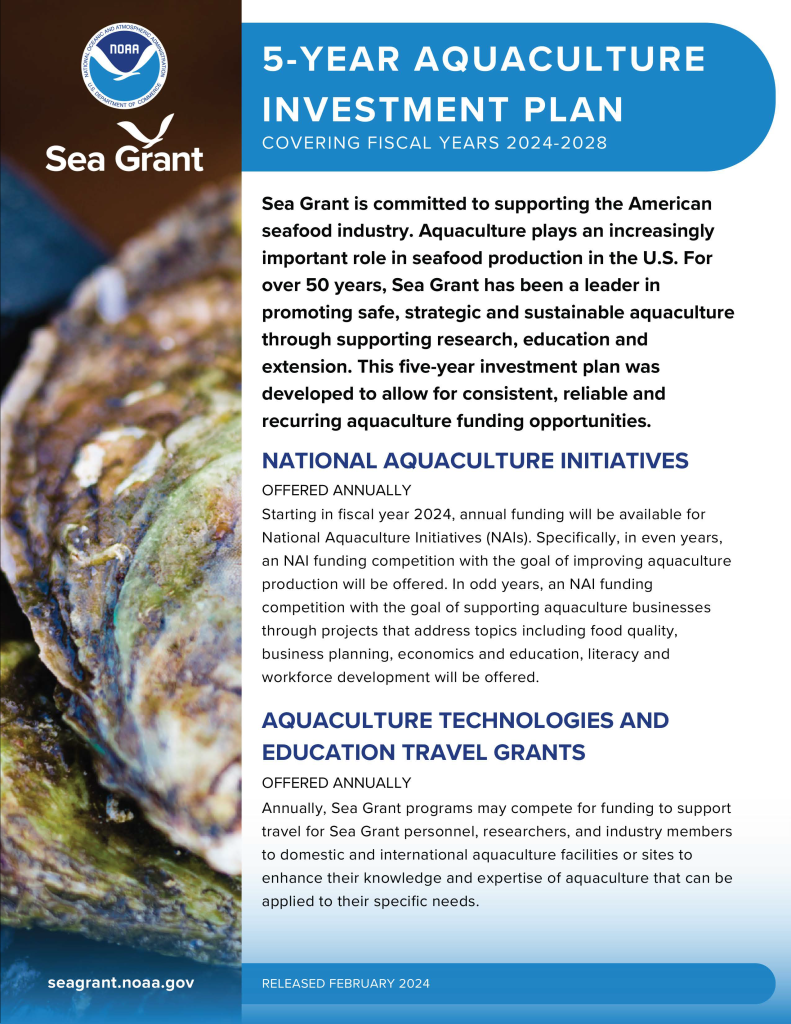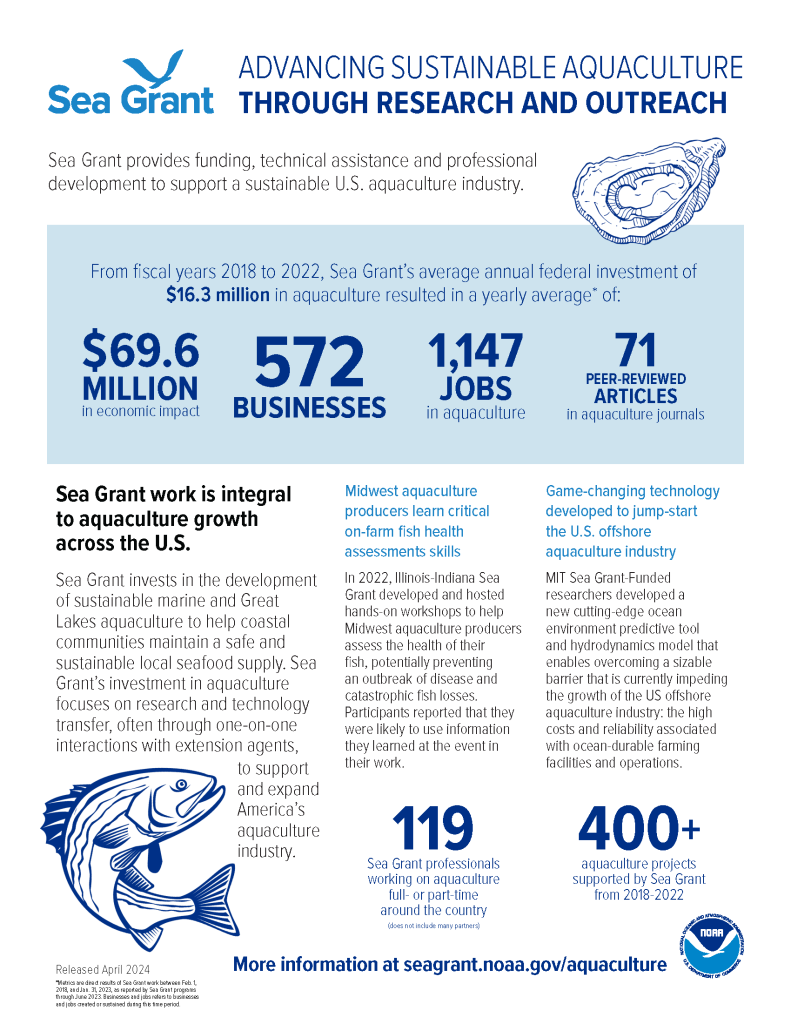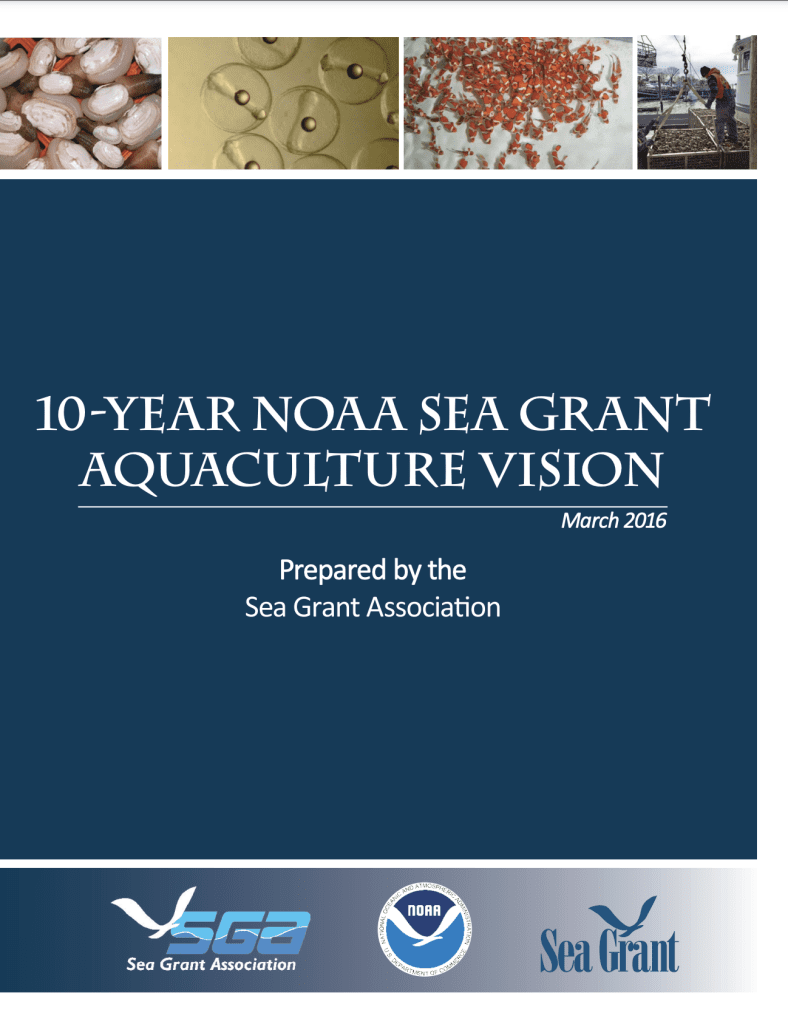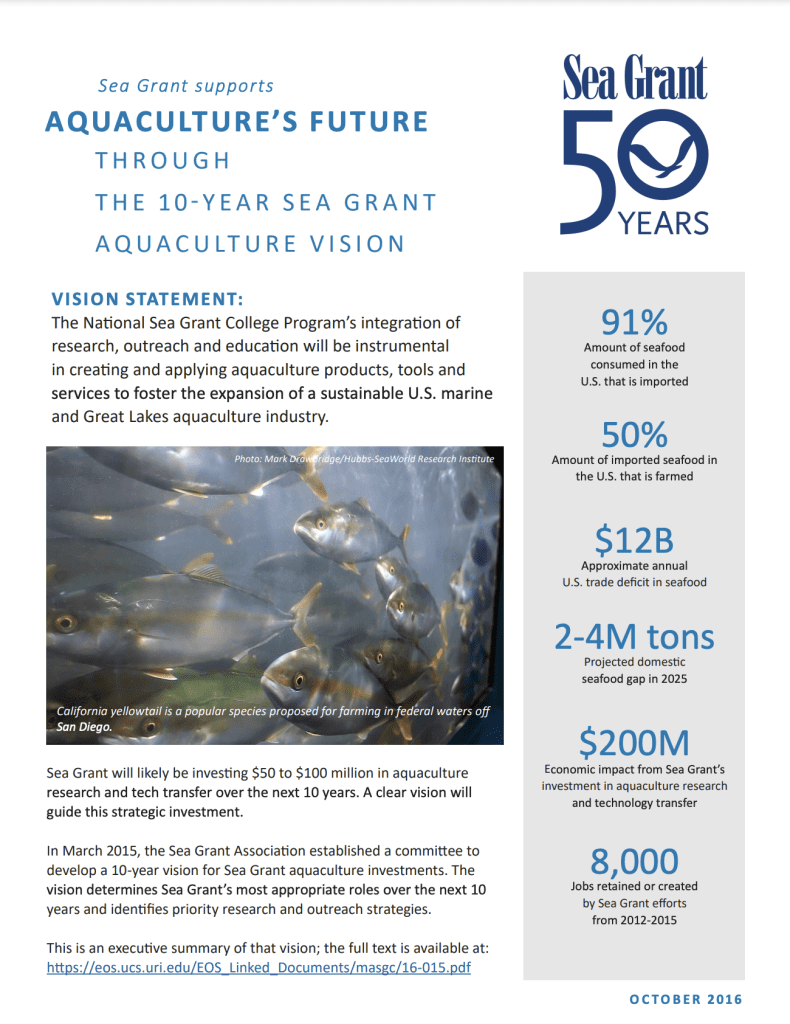Aquaculture
Sea Grant invests in the development of sustainable marine and Great Lakes aquaculture to help coastal communities maintain a safe and sustainable local seafood supply. Sea Grant’s investment in aquaculture focuses on research and technology transfer, often through one-on-one interactions with extension agents, to support and expand America’s aquaculture industry. Questions about Sea Grant’s aquaculture work or the aquaculture funding opportunity may be directed to oar.hq.sg.aquaculture@noaa.gov. Check out our related subjects:
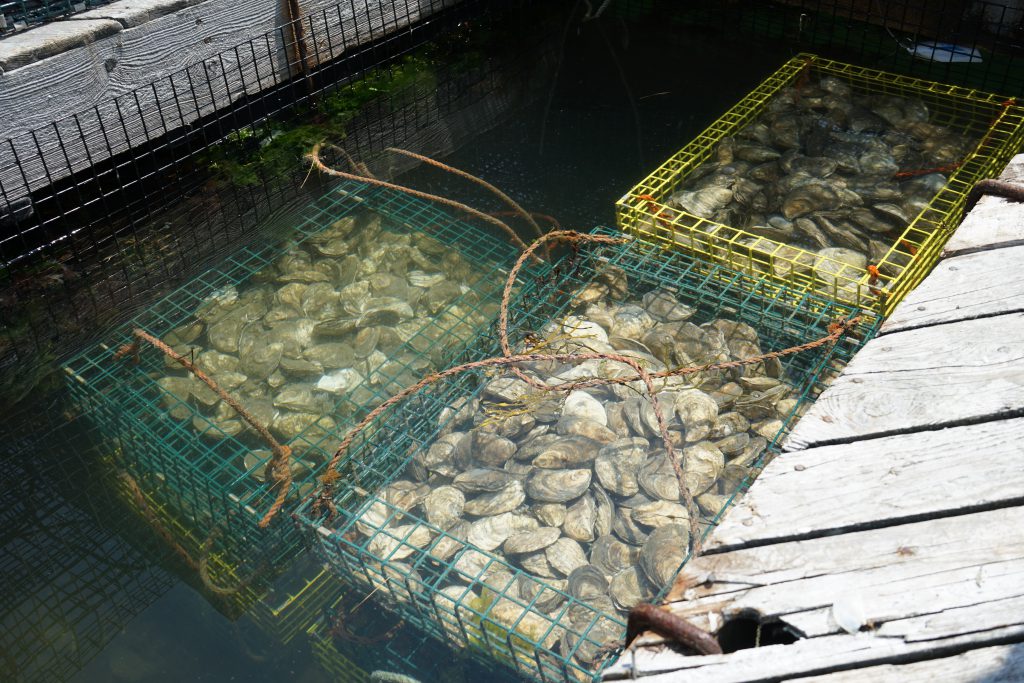
From FY 2018 to 2022, Sea Grant’s average annual federal investment of $16.3 million in aquaculture resulted in a yearly average* of:
$69.6
572
BUSINESSES
1,147
JOBS
71
PUBLICATIONS
*Metrics are direct results of Sea Grant work between February 1, 2018 and January 31, 2023, as reported by Sea Grant programs through June 2023. Sea Grant’s average annual federal investment during this time = $16.3 million. Sea Grant Investment = Funding to advance aquaculture research, technology transfer, and extension. Economic impact = market and non-market value of Sea Grant’s work related to aquaculture; value of jobs and businesses. Businesses = the number of aquaculture businesses created or sustained as a result of Sea Grant efforts. Jobs = aquaculture jobs created or sustained as a result of Sea Grant efforts.
Meet the Experts
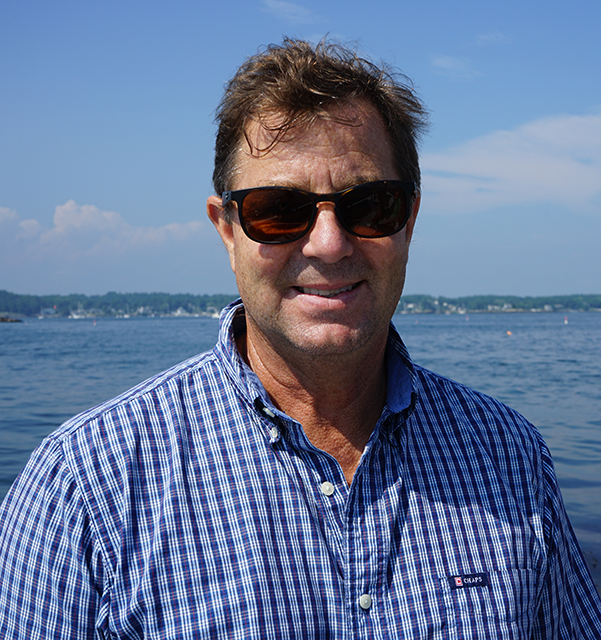


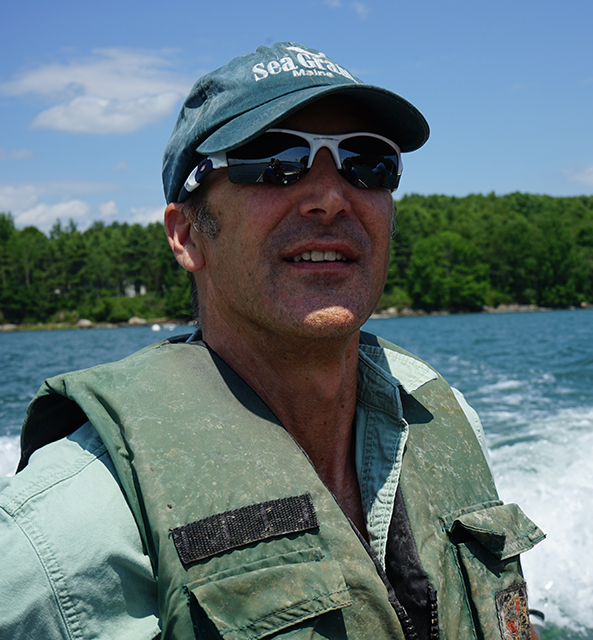


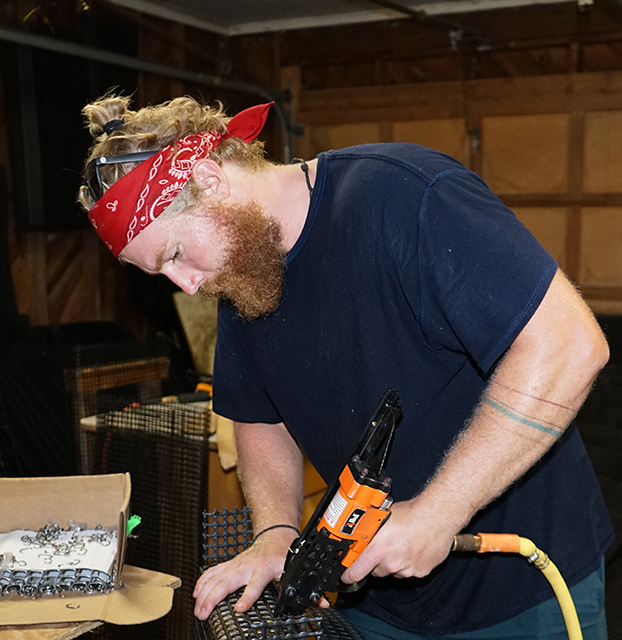











Reference Resources
Story Highlights
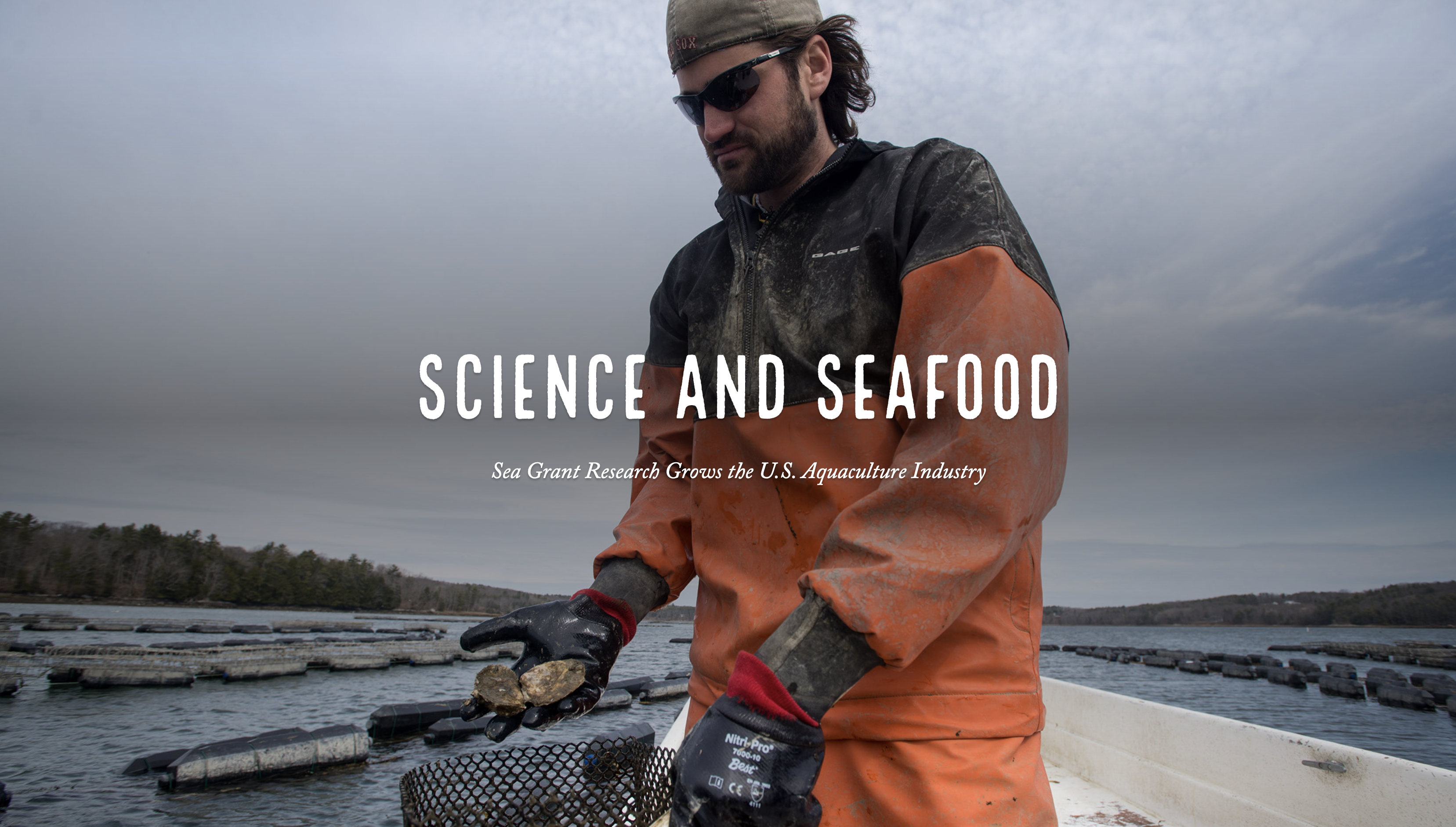

Science & Seafood
Sea Grant invests in the development of sustainable marine and Great Lakes aquaculture businesses to help coastal communities maintain a safe and sustainable local seafood supply that complements, not replaces, wild-caught fisheries.
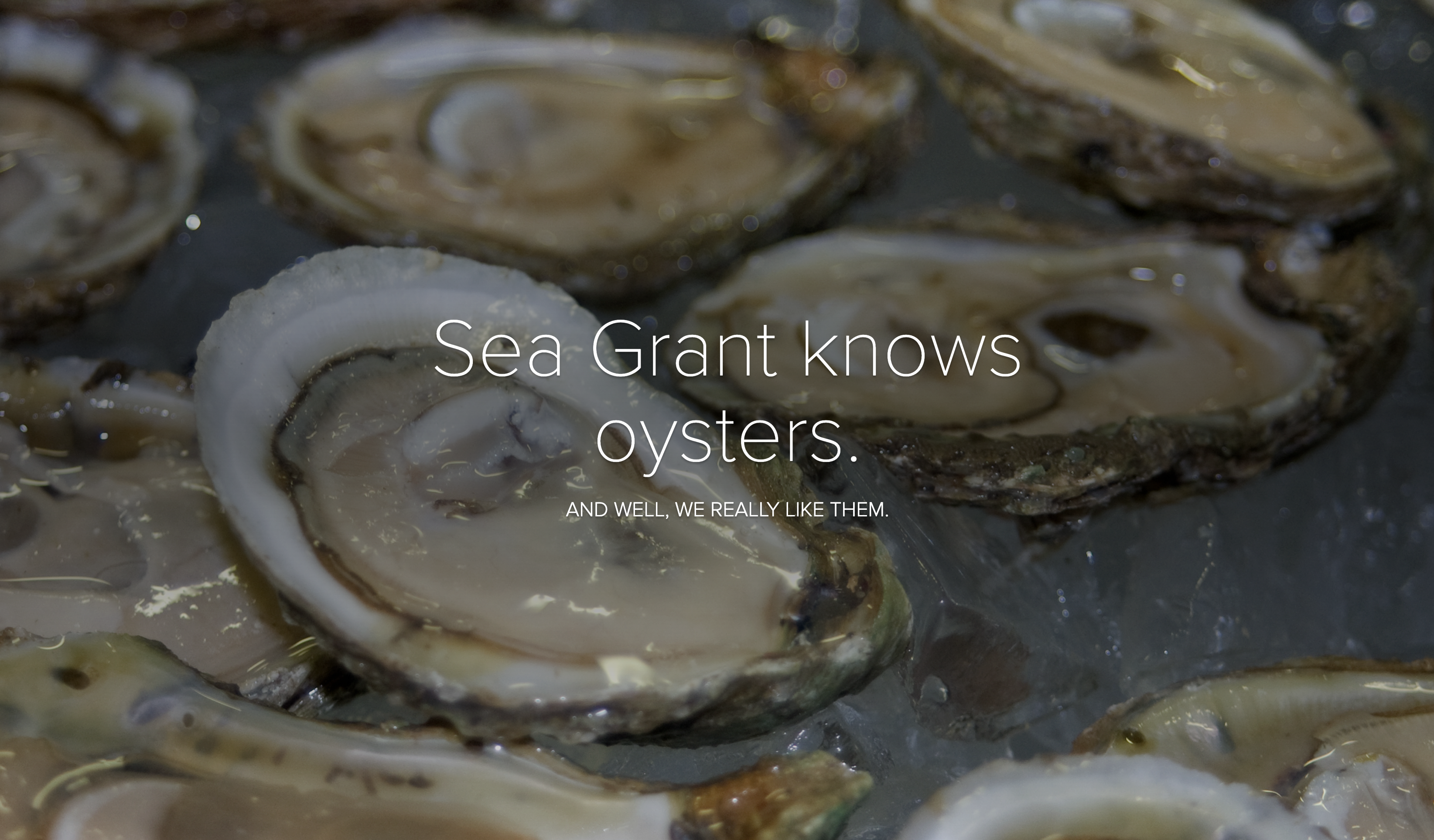

Sea Grant Knows Oysters
Here at Sea Grant, we study oysters (a lot!), and we support hundreds of small businesses that grow, harvest, and serve oysters by providing training and technical assistance.
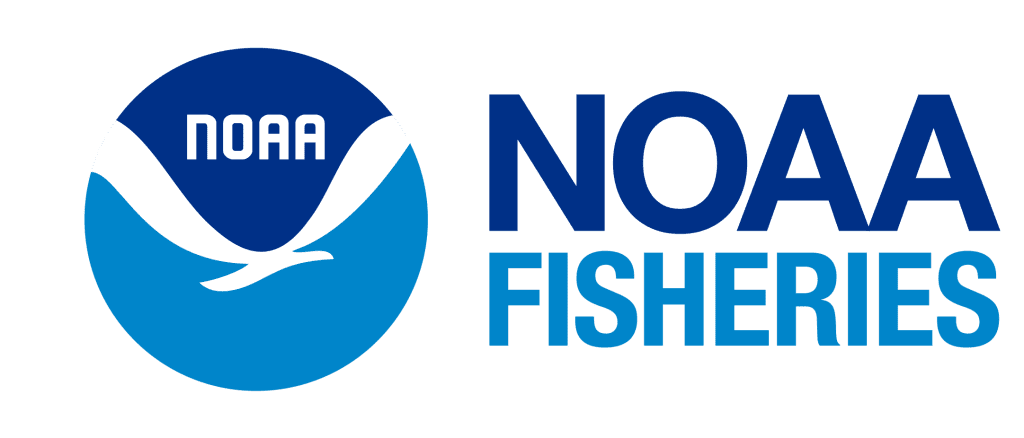

Resources from NOAA Fisheries
Read more about what NOAA is doing for aquaculture at the NOAA Fisheries website.
Featured Aquaculture Research
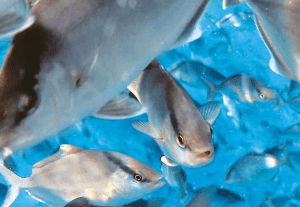


Sea Grant Continues to Support the U.S. Aquaculture Industry with FY23 Investments
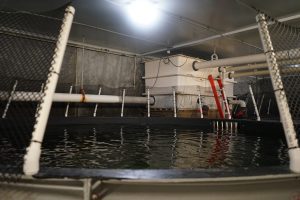

Wisconsin Sea Grant Helps Launch Innovative Salmon-Raising Business
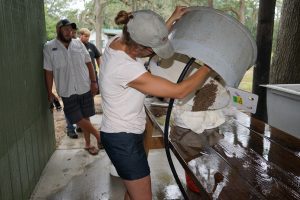

South Carolina Sea Grant Consortium Partnership Supports Aquaculture Business Development by Increasing Oyster Seed Availability
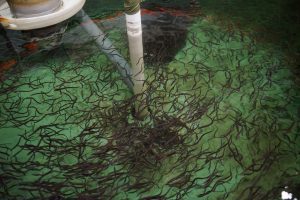

Maine Sea Grant Works to Advance American eel Aquaculture in the U.S.
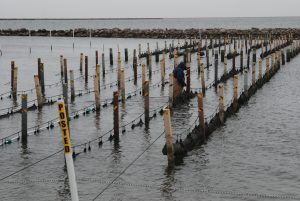

Sea Grant Integrated Program Expands Oyster Farming Industry in Alabama
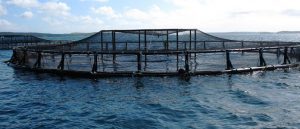

New Report Identifies Next Steps for Offshore Aquaculture in Southern California
Aquaculture Funding
- Sea Grant Continues to Support the U.S. Aquaculture Industry with FY23 Investments (2023)
- Sea Grant Projects Provide $3.3M in Support of Seafood Industry Workforce Development (2023)
- NOAA Sea Grant Announces $14 Million in Investments to Strengthen U.S. Aquaculture (2022)
- NOAA Sea Grant and Ocean Acidification Program Projects to Examine Impacts of Stressors on Shellfish Aquaculture (2021)
- Sea Grant Selects “Food From the Sea” Career Program Development Projects (2021)
- NOAA Sea Grant Awards $3.5 Million to Improve Sustainable Aquaculture, Strengthen Seafood Resources (2021)
- Sea Grant Awards $4.7 Million to Strengthen Economics of U.S. Aquaculture (2021)
- National Sea Grant Aquaculture Initiative: 2020 Update
- Sea Grant Responds to COVID-19-Related Challenges Across the Country (2020)
- Sea Grant awards $16 million to advance U.S. aquaculture (2019)
- Sea Grant Announces 2018 Aquaculture Research Awards (2018)
- 2023 – Aquaculture Workforce Development Projects
- 2022/2023 – Aquaculture Economics & Markets Collaborative; Aquaculture Technologies & Education Awards; Aquaculture Supplemental Funding (PDF)
- 2022 – Early Stage Propagation Strategies; Marine Finfish Juvenile Production Technologies; Advanced Aquaculture Collaboratives Continued; Aquaculture Information Exchange Creation (PDF)
- 2021 – eeBLUE Aquaculture Literacy Mini-Grants Program
- 2021 – Addressing the Impacts of Multiple Stressors on Shellfish Aquaculture through Research/Industry Partnerships (PDF)
- 2021 – “Food From the Sea” Careers Program (PDF)
- 2021 – Addressing COVID-19 Impacts to Seafood Resources (PDF)
- 2021 – Addressing Economic and Marketing Needs of the U.S. Aquaculture Industry (PDF)
- 2020 – Aquaculture Supplemental Funding (PDF)
- 2020 – COVID-19 Rapid Response Funding (PDF)
- 2019 – Advanced Aquaculture Collaborative Programs – Hubs; Exploring New Aquaculture Opportunities; Social, Behavioral, and Economic Research Needs in Aquaculture (PDF)
- 2018 – Sea Grant National Aquaculture Initiative
- 2017 – Integrated Projects to Advance Aquaculture (PDF)
- 2017 – Addressing Impediments to Aquaculture (PDF)
- 2016 – Research (PDF)
- 2016 – Workshops/Trainings (PDF)
- 2015 (PDF)
- 2014 (PDF)
- 2013 (PDF)
- 2012 (PDF)
- 2010
- 2006
Aquaculture Hubs
As part of Sea Grant’s 2019 National Aquaculture Initiative, 11 funded projects are focused on accelerating the development of specific aquaculture topics through integrated teams of professionals. These teams established collaborative programs, commonly referred to as “Hubs”, to plan for and appropriately focus the next generation of aquaculture investments while enhancing the synthesis and transfer of past research advances to the industry.
Aquaculture Hub Links:
- East Coast Hard Clam Selective Breeding Collaborative
- Atlantic and Gulf Shellfish Seed Biosecurity Collaborative
- Great Lakes Aquaculture Collaborative
- Hawai’i-Pacific Aquaculture Consortium
- Indigenous Aquaculture Collaborative
- Maine Aquaculture Hub
- Recirculating Aquaculture Salmon Network
- Seaweed Hub
- StriperHub
- Southern New England Shellfish Aquaculture Hub
- West Coast Aquaculture Collaborative
NATIONAL AQUACULTURE SYMPOSIA
In Fall 2021, the National Sea Grant Office hosted two Aquaculture Research Symposia to bring together researchers and their teams involved in projects funded through the 2019 National Strategic Initiative competitions. Awardees shared their work and findings with members of the aquaculture community through live talks, followed by time for discussion. Please see the links below for PDFs of project presentations.
The first symposium was held October 25-29, 2021 and focused on projects funded through the “Exploring New Aquaculture Opportunities” and the “Social/Behavioral/Economic Needs in Aquaculture” competitions.
- Download Exploring New Aquaculture Opportunities Presentations
- Download Social/Behavioral/Economic Needs in Aquaculture Presentations
The second symposium was held November 1-3, 2021 and focused on projects funded through the “Advanced Aquaculture Research Collaboratives” (Hubs) competition.
Aquaculture News


NOAA Sea Grant Develops 5-Year Aquaculture Investment Plan
Year-over-year, Sea Grant is committed to supporting aquaculture development across the nation, as a means of enhancing economic resilience and nutritional security in American communities. Sea Grant recently developed a five-year Aquaculture Investment Plan to guide its efforts in supporting aquaculture research, extension and education.



Sea Grant Continues to Support the U.S. Aquaculture Industry with FY23 Investments
In fiscal year 2023, Sea Grant invested $14 million in federal funding to support several new initiatives, including the Aquaculture Economics and Markets Collaborative, Aquaculture Technologies and Education Awards, Aquaculture Supplemental Awards and the previously announced Seafood Industry Workforce Development Awards. In addition, fiscal year 2023 investments supported the continuation of Early Stage Propagation Strategies for Aquaculture Species Awards, Marine Finfish Aquaculture Juvenile Production Technologies Awards, Advanced Aquaculture Collaboratives, and the Aquaculture Information Exchange.


Virginia Sea Grant Launches the USDA and NOAA-Supported Aquaculture Information Exchange Online Community Platform
The Aquaculture Information Exchange (AIE) online community platform website is now live and open for new user registrations. The AIE represents a joint effort between NOAA’s National Sea Grant Office, NOAA’s Fisheries Office of Aquaculture, USDA’s Agricultural Research Service (ARS), USDA’s National Institute of Food and Agriculture (NIFA), and Virginia Sea Grant.
